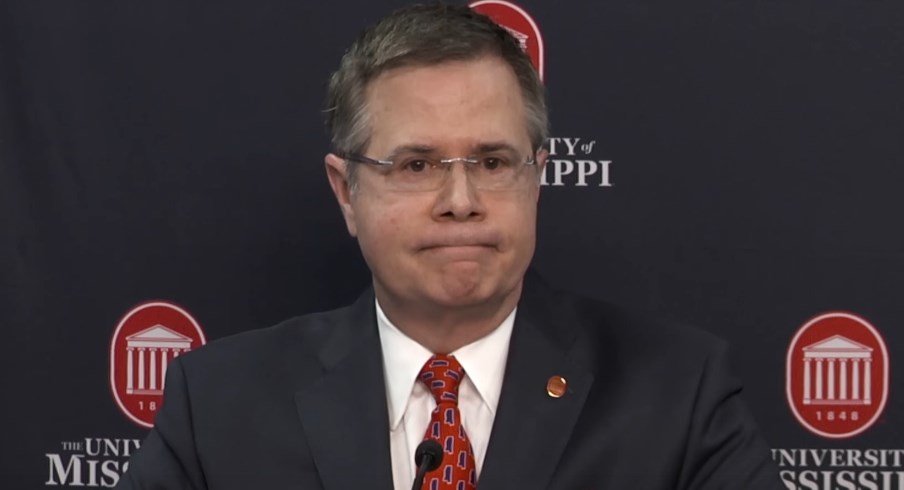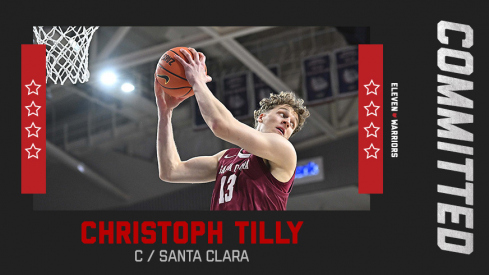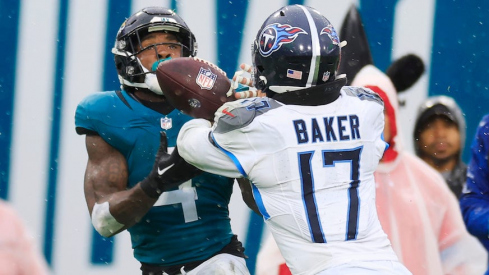This is probably my favorite kid right now in all of college sports:
NCAA alledges #OleMiss staffer connected a recruit to 2 boosters who paid the kid $13,000-$15,600 (AND that player didn't even sign with OM)
— Bruce Feldman (@BruceFeldmanCFB) February 22, 2017
A tip of the hat to you, Mr. Anonymous Genius College Football Recruit! Because dammit, there is no reason why any big time college football recruit shouldn't do the exact same thing if offered a metric butt ton of cash; if universities view your attendance from a financial cost/benefit perspective, why shouldn't you? Ultimately all that matters for the athlete is the opportunity to maximize their earning potential in a professional league of their choosing.
That's a mercenary way to look at things to be sure, and I don't really 100% believe that, but it's also the nature of the beast (and has been for quite some time). We'll get back to Ole Miss in a bit, but the lesson that we should take away from this really, really hilarious anecdote is that not only do college athletic programs/boosters/whoever think that they can buy someone's loyalty, but they also think that they take on more or less the same kind of risk that the student-athlete takes on when agreeing to break the rules.
And... they don't. It is way, way more risky for the university. The myth of the alma mater, a venerated institution that stands above all, has mostly if not completely faded away. In an era of instantaneous information, people are far more apt to forget and forgive individual athletes for transgressions rather than institutions, making the risk much, much greater for the Ole Misses of the world than the Laremy Tunsils.
People will watch an athlete get suspended or apologize or claim that their account was hacked or cry crocodile tears, but hell, at least it's something. Because in comparison, people will watch Penn State and Baylor and Notre Dame and any number of other universities attempt to cover up significant, horrific wrongdoings and then silence those who speak out against them.
It's not just that there's a disparity in the crimes (taking money from a booster versus allegedly enabling sexual assault), it's that finally people are starting to understand that repeated systemic moral and legal failures must be laid at the feet of the institutions that propagate them.
An individual that takes part in these failures is wrong, but the people who prop up the system that encourages those failures are worse.
Ohio State hasn't been accused of anything close to what has apparently gone on at places like Baylor and Penn State and I'm certainly not trying to equate them, but here's a little bit of what I mean by colleges and universities struggling with reconciling their relative position publicly with that of their athletes: earlier this week, there was some controversy raised when Terrelle Pryor was left out of an Ohio State quarterback highlight reel.
It was a pretty ridiculous omission considering what the guy was able to accomplish at the quarterback position at Ohio State, not just statistically, but in terms of mind-bending plays that made us here at 11W give him the really embarrassing nickname of "LeBron in Cleats," which mercifully lasted about a week.
People who might agree with leaving him out of that highlight reel might also point out that guys like Rex Kern and Stanley Jackson and Todd Boeckman were omitted despite all of them having better careers than, say, Kirk Herbstreit, and those same people might also point out Pryor's disgusting transgressions against man and nature which included selling his own stuff to try and make money.
But really, all of that serves to prove my point: it's not that Pryor's crime was so bad that Ohio State can't forgive the guy, it's that his crime helped to bring low a coach and an administrator. Art Schlichter, who is in the video lauding Ohio State greats, is currently serving a ten year prison sentence. Troy Smith, who was once suspended for accepting $500 from a booster, is also in the video, having won the Heisman and caused everyone to forget about that first little detail.
Pryor, for playing a part in the Jim Tressel saga, gets left out, intentionally or not.
Weep not for ol' TPeezy. A cursory glance at the comment section of our post about the video shows that the guy has a lot of support among Ohio State fans, likely in no small part to being the only functional part of a Cleveland Browns offense that for the entirety of 2016 looked about as appetizing as a half eaten ringpop floating in week-old hot dog water.
For his part, Pryor still seems to love Ohio State, and is poised to make an insane amount of money sometime in the next few months. And while at the time it seemed like a big deal, in retrospect what Pryor and others on the team did to earn some quick scratch seems so hilariously minor that it makes my head hurt thinking about how stressed out it made me. Over time, and in the court of public opinion, Pryor has won this fight.
So let's head back to Ole Miss for a second.
That's Ole Miss chancellor Jeffrey Vitter, staring awkwardly into the camera and insisting to the internet that everyone at the south's 87th most venerated place of learning is super competent and morally sound, despite a mountain of evidence suggesting that they aren't. Then dead man walking Hugh Freeze comes on and at that point you should really just turn the video off because 20 minutes of guys about to be fired talking about how they're going to fix everything is really irritating after a while.
For a long, long time Freeze and company were brazenly defiant at any suggestion that they were in violation of NCAA rules, and now that the hammer is about to drop they somehow think that a self-imposed postseason ban and a contrite YouTube video will save their asses.
What's ironic is that the new round of NCAA allegations against Ole Miss came as a result of the nightmare that Laremy Tunsil had to deal with on his draft night, because that incident led the NCAA to continue their investigation into what was happening at Ole Miss.
I'm not particularly interested in all of the details of the Ole Miss case, except to point out that for both Ohio State and Ole Miss, their problems were and are always much worse for them than the players who were a part of them. Tunsil, who was once suspended for seven games in college, is now a multi-millionaire in the NFL. Pryor is going to get paid, and noted human garbage pile Jameis Winston gets to stand up in front of elementary school kids and say weird, sexist crap after someone actually invited him to show up.
On the other hand, Ole Miss is being charged with the dreaded "Lack of Institutional Control" and has already given up nearly $8 million in postseason cash. Ohio State ended up giving up postseason play in an incredibly promising year, losing potentially millions of dollars.
So as Ole Miss or Baylor or Penn State or whoever else is starting down the barrel of NCAA sanctions, maybe other colleges and universities need to acknowledge that their belief that they can ride out a wave of malfeasance in the same way an athlete can is simply wrong. No amount of mopey videos or half-assed apology press conferences are going to change how the public perceives an institution that has done wrong and pretended that their actions were on par with that of an individual athlete.
I'm eventually going to forget why Terrelle Pryor was suspended and left the team. I'm not going to remember Laremy Tunsil's bong mask (sadly). What I won't forget is how Ole Miss might've spent hundreds of thousands of dollars engaged in years of corrupt recruiting, or how Baylor coaches and administrators allegedly covered up literally dozens of sexual assaults in their midst, or, far less seriously, how Ohio State tried to paint Pryor and company as a couple of bad apples who ruined things for everybody instead of pointing the finger inward. And I hope that both law enforcement and NCAA compliance doesn't forget, either.
If athletic departments want to avoid the pitfalls that institutions that cheat and lie find themselves falling victim to, the answer is pretty simple: clean up your act. Not just because it's the right thing to do, but because colleges and universities must have a longer view of things than the students or coaches that they allow to break the rules or the law.
If they can pull that trick off, it will ultimately mean a lot fewer headaches in the short term, and hopefully fewer tragedies the likes of which we've seen too many of in college football recently.
If not, well, don't act surprised when you can't shrug off the yoke of shame as easily as players can, especially just after getting dunked on publicly by anonymous teenagers who took the money and split town.


